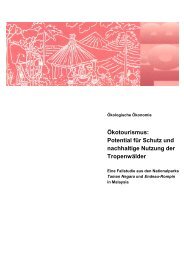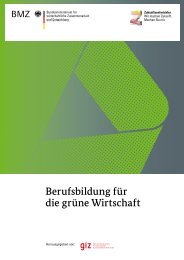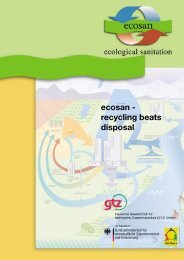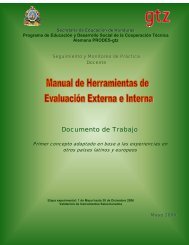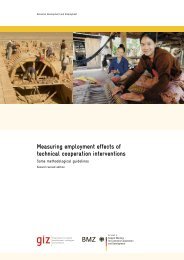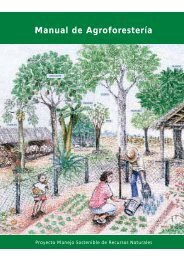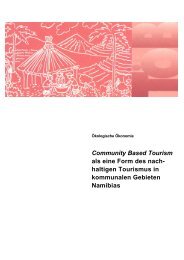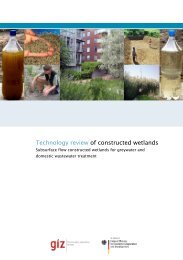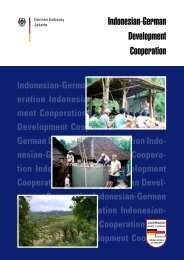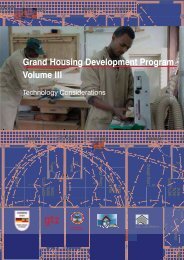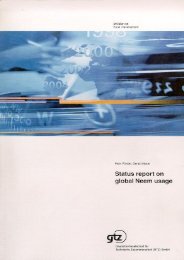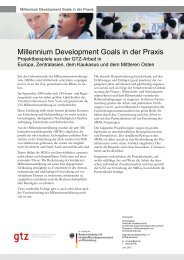innen und Eröffnung der Eschborner Fachtage 2000 - Gtz
innen und Eröffnung der Eschborner Fachtage 2000 - Gtz
innen und Eröffnung der Eschborner Fachtage 2000 - Gtz
Erfolgreiche ePaper selbst erstellen
Machen Sie aus Ihren PDF Publikationen ein blätterbares Flipbook mit unserer einzigartigen Google optimierten e-Paper Software.
<strong>Eschborner</strong> <strong>Fachtage</strong> <strong>2000</strong> - Themenschwerpunkt 1: Mitgestaltung internationaler Rahmenbedingungen<br />
Liebig stimmte <strong>der</strong> allgemeinen These zu, dass Handelsliberalisierung (insbeson<strong>der</strong>e wenn<br />
dies Beseitigung von Zöllen <strong>und</strong> an<strong>der</strong>en Grenzmaßnahmen bedeutet) im Prinzip gut ist,<br />
äußerte sich jedoch kritisch über die Zunahme <strong>der</strong> internen Politikregulierung, also den Eingriff<br />
in nationale Regelungen durch die internationalen Handelsabkommen. Er prognostizierte<br />
eine Zunahme <strong>der</strong> Konflikte zwischen handels- <strong>und</strong> umwelt- bzw. ges<strong>und</strong>heitspolitischen<br />
Zielen.<br />
Gr<strong>und</strong>sätzlich sah er auch mögliche Wi<strong>der</strong>sprüche zwischen den entwicklungspolitischen<br />
Zielen <strong>und</strong> <strong>der</strong> Umsetzung <strong>der</strong> WTO-Regeln. So trage zwar Handel über seine Wachstum seffekte<br />
zur Armutsmin<strong>der</strong>ung bei, ob dies aber einzelnen Gruppen zugute käme wie z. B.<br />
Frauen o<strong>der</strong> ob dies auch eine nachhaltige Entwicklung gewährleiste stellte er in Frage <strong>und</strong><br />
kritisierte, dass den makroökonomischen Untersuchungen oftmals die mikroökonomische<br />
Untermauerung fehle. Es sei daher schwierig, den wirklichen Einfluss <strong>der</strong> WTO-Regeln zu<br />
analysieren. Schließlich meinte er, dass aufgr<strong>und</strong> <strong>der</strong> wirtschaftspolitischen Interessen <strong>der</strong><br />
B<strong>und</strong>esrepublik ein Konflikt mit dem entwicklungspolitischen Ziel einer Stärkung <strong>der</strong> Verhandlungsposition<br />
<strong>der</strong> Entwicklungslän<strong>der</strong> in <strong>der</strong> WTO nicht ausgeschlossen ist.<br />
2. Eight Years After Rio: What Can Technical Co-operation Contribute to<br />
the Global Dialogue on Forests?<br />
Dr. Christian Mersmann, Evy Thies, GTZ-Arbeitsfeld: Politik <strong>und</strong> Regionalentwicklung<br />
At the UN Conference on Environment and Development (UNCED) in 1992 in Rio de<br />
Janeiro, a new era was initiated <strong>und</strong>er the motto ”All Forests World-Wide”, with the globally<br />
recognised Forest Principles and with Chapter 11 of Agenda 21. The two documents are<br />
regarded as the first global compromise for sustainable forest management. Since then,<br />
forest issues have been addressed by a temporary working group of the UN Commission on<br />
Sustainable Development (CSD). At present, the permanent UN Forum on Forests is being<br />
established, which is to continue the forest policy dialogue at the international level. One of<br />
the principal functions of this forum will be the co-ordination of the international forest regime,<br />
which includes conventions such as CBD, CCD and FCCC, international organisations such<br />
as FAO and World Bank as well as international mechanisms such as GEF.<br />
Which functions in relation to forests must Technical Co-operation (TC) assume in future in<br />
or<strong>der</strong> to promote capacity development for the successful completion of global and domestic<br />
tasks in our partner countries? What qualification profile will our partners expect TC advisers<br />
to have in or<strong>der</strong> to be able to use effectively the bewil<strong>der</strong>ing array of forest-related instruments?<br />
What political processes must TC <strong>und</strong>erstand and actively support, in or<strong>der</strong> to integrate<br />
into the global context the principal players and their institutions within the framework<br />
of national forest programmes?<br />
The presentation of the TWRP Sector Project provides an overview of ongoing processes<br />
and the contribution of TC to date. A perspective is offered on the future programme of the<br />
new UN Forum on Forests and on what is expected of our partner countries. An internationally<br />
co-ordinated strategy is to be introduced with which TC can meet and master the new<br />
challenges.<br />
41



